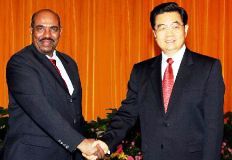US cites Chinese willingness to wield influence in Sudan
By Edward Cody
Jan 12, 2007 (BEIJING) — The U.S. special envoy to Sudan said Friday that China has pushed the Sudanese government recently to help resolve the bloody Darfur conflict and ease the plight of the region’s nearly 3 million refugees.
 The Chinese intervention marked a shift from past policy under which Beijing seemed reluctant to use its influence in Sudan, according to the envoy, Andrew S. Natsios. “I think they’re engaging much more aggressively,” Natsios said at a news briefing after four days of talks here with Chinese officials.
The Chinese intervention marked a shift from past policy under which Beijing seemed reluctant to use its influence in Sudan, according to the envoy, Andrew S. Natsios. “I think they’re engaging much more aggressively,” Natsios said at a news briefing after four days of talks here with Chinese officials.
President Hu Jintao announced during a Chinese-African summit conference last November that he had urged the Sudanese president, Omar Hassan al-Bashir, to work with U.N. and other envoys to end the fighting, Natsios recalled. In addition, he said, China’s U.N. ambassador, Wang Guangya, was critical to securing Sudan’s participation in a recent international accord aimed at replacing a flagging African Union peacekeeping force in Darfur with a larger U.N. contingent.
The Bush administration has long urged China to put more pressure on the Sudanese government, citing large-scale Chinese oil purchases, investment and weapons sales as tools that could be used to persuade Bashir to cooperate more fully with U.N. attempts to broker a peace accord.
China, however, has viewed Sudan mainly as an important source of petroleum, a key element in Chinese foreign policy as the booming economy here creates a growing thirst for energy imports. In contrast, the United States in recent years has regarded Sudan mainly in the context of its Islamic-oriented government and the humanitarian tragedy caused by the fighting in western Sudan’s Darfur region.
As many as 450,000 people have been killed or have died from disease in Darfur since largely black African rebel groups rose up in 2003 against the Arab-run government. Human rights groups and the United Nations say the government responded by unleashing a militia, called the Janjaweed, which has been accused of atrocities. Natsios said 2.8 million people fleeing raids by government troops and militiamen have been driven into refugee camps supported by U.N. and other nongovernmental aid agencies.
Bashir announced Wednesday that he would abide by a 60-day cease-fire and expand access for international aid workers. His government followed up Thursday by saying it would also be willing to enter a new round of peace talks with the rebels.
Bashir’s agreement to the cease-fire came after talks with Gov. Bill Richardson (D) of New Mexico, who traveled to Khartoum on behalf of the Save Darfur Coalition, a Washington-based humanitarian group. Richardson said several of the eight rebel movements had also agreed to hold their fire. Thursday’s embrace of peace talks followed Bashir’s meeting with Jan Eliasson, the new U.N. special envoy to Darfur, who was seeking cooperation with the U.N. plan to send more peacekeepers.
Bashir’s government had opposed plans to replace the 7,000 African Union troops with a U.N. force that Natsios said could include as many as 17,000 soldiers and 3,000 police officers. But Bashir recently agreed to allow in as many as 2,500, Natsios added.
(The Washington Post)
